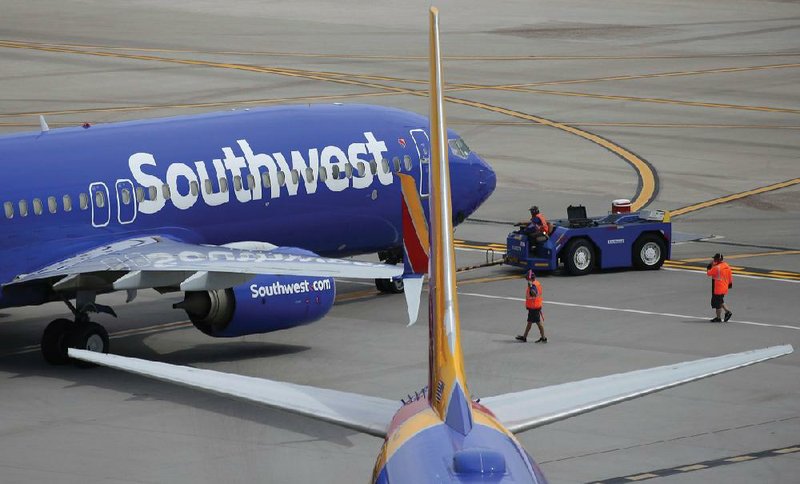DALLAS -- Southwest Airlines posted its first quarterly loss in nearly a decade and said Tuesday that the downturn in air travel that began in late February shows no signs of letting up.
The airline said trip cancellations have pulled back from a peak in March but remain at levels that Southwest has never seen, as customers scrap plans to travel during the coronavirus pandemic.
Southwest expects revenue to drop 90%-95% in April and May compared with a year ago, with only 5%-10% of seats on its planes filled. With little revenue coming in, Southwest is burning through $900 million in cash a month.
Bookings for April, May and June are weak, and they have been outnumbered by cancellations. Southwest hopes that as states ease their stay-at-home orders and some businesses and tourist destinations reopen, more people will want to fly -- maybe by midsummer, the traditional vacation season.
[CORONAVIRUS: Click here for our complete coverage » arkansasonline.com/coronavirus]
"We have decent bookings in place for July," chief executive Gary Kelly told reporters. "We just have no way to predict what cancellations will be."
Airlines for America, a trade group for the leading U.S. carriers, said the average domestic flight in the past week had 17 passengers -- although there have been incidents of crowded planes with many passengers not wearing masks.
Airlines are starting to think about how to make passengers feel safe when the numbers rise.
Kelly said Southwest is considering temporary measures including leaving all middle seats open, which would limit its planes to two-thirds of their normal capacity. Anything more, he suggested, is impossible without raising fares.
[Video not showing up above? Click here to watch » https://www.youtube.com/watch?v=dI6-4_QquZ8]
Southwest and other airlines say they encourage passengers to wear masks. JetBlue said late Monday that it will be the first airline to require masks, beginning next week. Airlines say they are stepping up cleaning of planes between flights. The airline industry is lobbying to screen passengers to prevent them from getting on a plane if they have a fever.
President Donald Trump said his administration was discussing the idea of screening passengers for both fever and the presence of the virus that causes covid-19.
"We are also setting up a system where we do some testing, and we are working with the airlines on that," Trump said Tuesday. "On the plane, getting on the plane."
Kelly said screening would help people feel comfortable about flying again.
[Gallery not loading above? Click here for more photos » arkansasonline.com/429southwest/]
For now, passenger traffic is "virtually zero," Kelly told employees a few days ago. He said again Tuesday that if traffic doesn't begin picking up by summer, Southwest could become a much smaller airline. That was a stunning statement, coming from the leader of an airline that says it has never laid off employees in 49 years of flying.
Dallas-based Southwest has never reported a full-year loss, but analysts expect that streak to end in 2020. Southwest has canceled thousands of flights, asked employees to take unpaid time off, grounded many of its planes, and negotiated for $3.2 billion in federal aid to help cover payroll costs through September.
The company has borrowed $6.8 billion this year, including the federal loan it has already received. Southwest said that it plans to apply for a second round of federal help, a secured loan of $2.8 billion, and is shopping for money from other sources.
Southwest took another step to raise cash Tuesday, disclosing plans to issue 55 million new shares of stock with underwriters getting an option for another 8.25 million shares, and issue $1 billion in debt that can be converted to stock. Those moves, which surprised analysts, sent Southwest shares lower initially, but by Tuesday afternoon they were up more than 2%. Shares of Delta, American and United soared higher by between 10% and 13%.
Southwest swung to a first-quarter loss of $94 million from a $387 million profit in the same period last year. The airline last reported a quarterly loss in September 2011.
The loss, after excluding some items, was 15 cents per share -- not as bad as the loss of 48 cents per share that Wall Street expected, according to a survey by Zacks Investment Research.
Revenue dropped 18% to $4.23 billion, as the number of passengers fell 21% -- three times faster than Southwest canceled flights. The average flight -- including the halcyon days of January and most of February -- was 68% full, an extraordinary drop of 13 points from early 2019.
As of last week, Southwest said, it had cash and short-term investments of $9.3 billion and mortgageable assets -- mostly planes -- worth nearly $8 billion to ride out the coronavirus crisis.
The company is revamping its order book with Boeing to come up with "a sensible delivery schedule."
In a statement Tuesday it said that it is cutting the number of Boeing Co. 737 Max jets it will take through December 2021 by more than half as the travel outlook remains bleak.
Max deliveries from Boeing will total no more than 48 through the end of next year. More than 120 planes had been expected. Also, the carrier will remove the Max from its schedule until late October of this year, as Boeing works to end a grounding that began in March 2019 after two crashes.
Information for this article was contributed by David Koenig and Jill Colvin of The Associated Press and by Mary Schlangenstein of Bloomberg News.
Business on 04/29/2020
